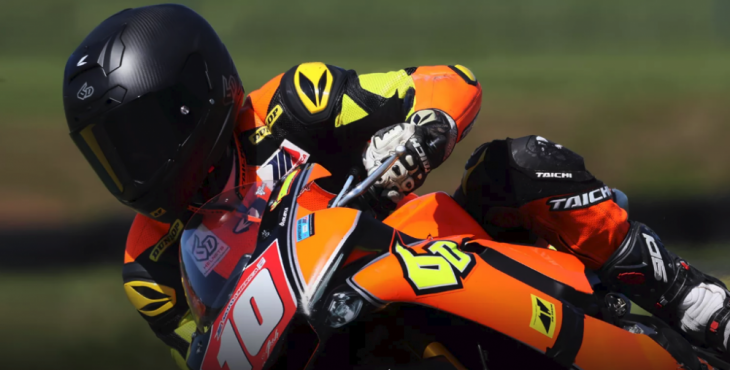Cycle News Staff | October 16, 2017
FIM Announces New Helmet Safety Standard – The FIM recently announced the launch of an all-new program, the FIM Racing Homologation Programme (FRHP). The Federation Internationale Motocyclisme has previously referred to existing international standards for the approval of helmets for use in competitions, but the FIM is now taking an active role toward setting “more innovative and demanding requirements,” namely oblique testing, to improve overall helmet safety.
The new program is already receiving praise from helmet companies such as 6D Helmets. “6D Helmets is excited to see advancements in a formal test standard that incorporates rotational testing and lower energy mitigation that the FIM has developed,” said 6D Helmets Director of Engineering Robert Reisinger. “We look forward to future advancements in helmet testing definitions and the positive results that it will bring for consumers and racers alike.”
FIM Announces New Helmet Safety Standard

Oblique testing measures the rotational forces incurred in a crash, and is what the FIM has identified as as a very common scenario occurring in motorcycle accidents. Current international helmet safety standards do not address oblique impacts.
The following is a release from the FIM…
The FIM Racing Homologation Programme (FRHP) for helmets now features the latest state of art of testing methods and sets more innovative and demanding requirements to be met, in addition to compliance with international standards. This homologation will be a mandatory prerequisite to be entitled to access FIM competitions, starting with Circuit Racing in 2019.
The helmet response to medium severity oblique impacts, among others, will be assessed in FIM approved laboratories such as the Impact Laboratory of the University of Zaragoza. The oblique test constitutes the most novel and modern aspect of the testing method and reflects a very common scenario occurring in accidents, although never addressed in international standards so far.
Vito Ippolito, FIM President: “The homologation will allow the FIM to ensure a more complete and high-end protection for its riders and in particular to better track and control helmets used in FIM competitions. The FIM is also hopeful that the new testing protocol will serve as an inspiration for disciplines other than Circuit Racing, and cascade to international standards for road use.”
Cristiano Silei, Dainese Group CEO: “In Dainese Group we constantly endeavor to increase the safety of our AGV helmets. The introduction by the FIM of a standard which entails oblique impacts represents a giant leap in this direction.”
FIM Announces New Helmet Safety Standard
Alban Rojas, SHARK Helmets Research & innovation manager: “SHARK Helmets has promoted motorcycle racing as a focus of brand development ever since its creation. Our brand’s ethos is always to push the technical boundaries and innovate to ensure the highest level of protection for all riders. We are very proud to work close with the FIM Racing Homologation Programme for helmets.”
Xavier Cadens, MatGroup R+D+I Manager: “A step forward on helmet safety at a global level.”
Robert Reisinger, 6D Helmets Director of Engineering: “6D Helmets is excited to see advancements in a formal test standard that incorporates rotational testing and lower energy mitigation that the FIM has developed. We look forward to future advancements in helmet testing definitions and the positive results that it will bring for consumers and racers alike.”
The FIM Racing Homologation Programme was established in order to grant special recognition to products related to safety and as a requirement for FIM competitions. The main aim of this program is to meet the need for an advanced evaluation of the safety performance of different kind of products such as helmets, tracking systems, circuit barriers and paints. The homologation is obtained when specific high performance and quality standards set for each product are met.
FIM Announces New Helmet Safety Standard